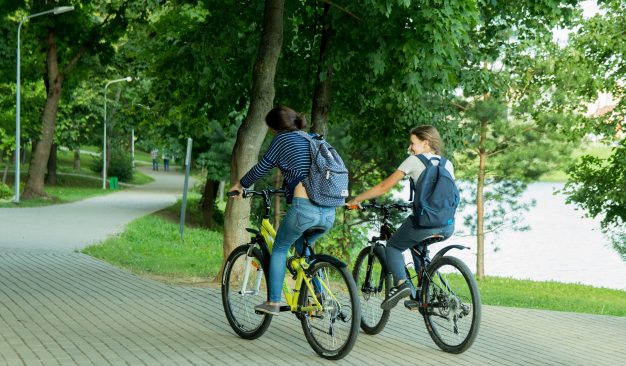
European Mobility Week 2021: ‘Youth engagement is vital for urban sustainability’
Young people must be ‘meaningfully engaged’ in the decision-making processes of cities’ sustainable mobility initiatives to help them fully achieve their goals.
That was one of the key findings of a workshop held as part of EUROPEANMOBILITYWEEK, Europe’s flagship awareness-raising campaign on sustainable urban mobility which promotes behavioural change in favour of active mobility, public transport, and other clean, intelligent transport solutions.
A group of selected young people aged 16-24 took part in an online workshop in June they met with policy-makers to discuss the importance of working together in planning and delivering policies.
ICLEI Europe, which promotes urban mobility change, moderated the event, which began with an impassioned presentation by Rut Einarsdóttir from the Icelandic National Youth Council. She highlighted that while many cities may invite young people to share their opinions, this did not necessarily mean policy-makers actually listened to what they had to say.
Cities, she said, must ‘move away from involving younger representatives of the community as tokens and photo accessories’, and instead ‘a meaningful youth engagement policy where young people’s voices are both heard and listened to’. “Young people are a big and growing proportion of our societies, and studies have shown that involving them in the decision-making process benefits, in fact, everyone,” she added.
‘A meaningful youth engagement policy’
On the need for cities and policies to reflect the desires of all citizens, Sara Borei spoke about Young Friends of the Earth Europe’s mission to collect the mobility visions of young people across Europe by way of the SystemReset project. These visions form the basis of a proposal for the European Green Deal. The project involved over 3,000 young representatives, at least 500 of whom were underrepresented. The collected visions called for fewer cars, especially in city centres, more space for cycling and pedestrians, and the prioritisation of more sustainable modes of transport over more polluting ones – alongside further mobility education.

The main EUROPEANMOBILITYWEEK event takes place every year from 16-22 September, with local authorities across Europe encouraged to use the week to experiment with innovative planning policies and promote new infrastructure and technologies. It culminates in the popular Car-Free Day when many cities close their streets to cars and encourage as many people as possible to walk and cycle.
The pandemic has meant that the last year-and-a-half has been like no other period in recent history, and so with the theme for 2021 being ‘Safe and Healthy with Sustainable Mobility’, the week will pay tribute to the hardships experienced across Europe and the wider world. It will also reflect on the opportunities for change presented by a health crisis like no other.
‘Car-Free School Day’
Every year various cities are singled out for the work they are doing to promote sustainable and safe mobility policies, and often these have a strong focus on the safety of children while travelling around their city. Last year’s winners included Mönchengladbach in Germany, which impressed the organisers with its variety of public engagement events and creative approach to new solutions, including competitions for children and converting 50 parking spaces into areas where children could play and park their bicycles.
Another winner from Germany was Lilienthal, which worked with the neighbouring municipality of Bremen to enlist the help of 55,000 schools and more than 60,000 pupils and students to organise a Car-Free School Day.
Dr. Mara Jekosch, and Ingo Wendelken, of Initiative Mobilität in Lilienthal (Germany), said: “Participating in EUROPEANMOBILITYWEEK, which was coordinated by Initiative Mobilität – a voluntary organisation in the city – had a great impact on sustainable mobility in the city. In particular, more attention was paid to the topic, which in turn led to local politicians approving investment for a walking and cycling project.”
Click here to read the recommendations of the European Commission’s young people’s workshop and here to watch a film.




